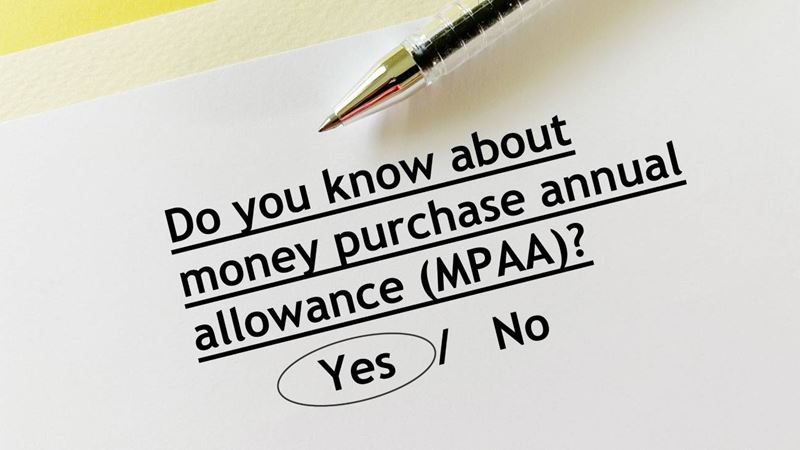

The MPAA reduces the amount you can pay into your pension and get tax relief. Find out what it is and what will trigger it.

This article is for general guidance only and is not financial or professional advice. Any links are for your own information, and do not constitute any form of recommendation by Saga. You should not solely rely on this information to make any decisions, and consider seeking independent professional advice. All figures and information in this article are correct at the time of publishing, but laws, entitlements, tax treatments and allowances may change in the future.
Did you know that as soon as you make a taxable withdrawal from a defined contribution pension, you’ll likely trigger the money purchase annual allowance (MPAA)? It has even been described as a “tax trap” as it’s a move that will drastically reduce the amount of money you can pay into your pension pot and get tax relief, from that date and in years to come.
So, whether you are yet to retire and want to take a lump sum out of your pension, or are planning to retire but want to maintain the flexibility to make further contributions, it’s important to understand the MPAA rules and limits.
Each year, you can get tax relief on what you pay into your pension, up to 100% of your income, and up to a maximum of £60,000, into your pension. You’ll hear this referred to as your pensions annual allowance and it includes money you pay in, any employer contributions and tax relief. (Some additional rate taxpayers have a reduced annual allowance.)
However, if you decide to make a taxable withdrawal from your pension – which you can do from age 55 (57 from 2028) – a new allowance takes over and that’s the MPAA.
This introduces a lower limit on the amount you can contribute to your defined contribution pensions each year while still receiving tax relief, explains David Gibb, a chartered financial planner at Quilter Cheviot.
The MPAA was introduced as a direct response to the ‘pension freedoms’ that were introduced in 2015 and made it easier for people to access their defined contribution pots. The idea was that the lower allowance would make it harder for savers to gain additional tax relief by taking money out of a pension, only to pay it straight back into their pot.
For the 2024/25 tax year, the MPAA is set at £10,000 gross (inclusive of tax relief). “If you have started to draw down from your pension funds, the maximum you can contribute to a pension and receive tax relief is £10,000, even if your income is higher than this,” adds Gibbs.
While you can usually carry over unused allowances from the previous three tax years, once you have triggered the MPAA you can’t bring over unused allowances to allow contributions of more than £10,000 to defined contribution pensions.
As a result, it’s essential to think about the MPAA and the impact it could have on your future retirement income, before you make a withdrawal.
According to recent research from the insurer Royal London, as many as a third of over-55s have taken money out of their pensions and triggered the MPAA.
Clare Moffat, pensions expert at Royal London, says the changing shape of retirement means workers are now less likely to have a hard stop to the world of work, preferring to transition gradually into retirement.
“This makes the MPAA an important consideration for workers planning to gradually retire by reducing their working hours, making it likely that many will come up against the MPAA if they want to start paying more into pensions again,” she adds.
But it’s not just those that are winding down from work gradually that need to consider the MPAA. It’s also important to think about the reduced allowance if you have no plans to retire yet but want to take a lump sum out of your pension – perhaps to clear a mortgage, pay for a big holiday or a new kitchen.
This is especially the case if you’re a higher earner or likely to be in a position to boost your pension with a bonus or inheritance in the final years of your career.
The MPAA is triggered when you access your pension ‘flexibly’, explains Moffat.
The most common ways to take money out flexibly, and trigger the MPAA, are if:
Under pension rules, your pension provider is required to tell you when you have triggered the MPAA and you will need to report this on your self-assessment tax return. “If you go over the MPAA accidentally, you will still be liable for the tax charge, so it's important to keep track of your contributions,” says Quilter Cheviot’s Gibb.
You will also have a duty to inform any other pension providers you might have. The MPAA starts to apply from the day after you’ve taken flexible benefits, so previous savings aren’t affected.
There are some ways that you can access your pension savings without triggering the MPAA, which could be helpful if you want to protect your £60,000 annual allowance.
This includes:
Once you’ve triggered the MPAA then it can’t be undone, even for future tax years, so it’s important to think through taking any money out, adds Moffat.
“For many people, their 50s are the point that they are earning the most and able to pay more into pensions, so triggering the MPAA could limit pension contributions and that could mean that you might not have the retirement that you planned. Making sure that any pension is accessed in a way which means that it can be built back up again later is important,” she says.

The MPAA can only be triggered with defined contribution pensions and does not apply to defined benefit schemes because they cannot be flexibly accessed in the same way.
However, if you have triggered the MPAA on a defined contribution scheme (and are therefore limited to £10,000 in contributions each year) but also have a defined benefit scheme, you may be able to make contributions to your defined benefit scheme without incurring any tax charges. This is referred to as the alternative annual allowance. If you are concerned that you might breach your allowances, it's best to check with your pension scheme or seek financial advice.
The rules around contributions, tax and allowances for pensions can be confusing. If you aren’t sure what to do, help is available. If you are over 50, you can arrange an appointment with Pension Wise, a free pension guidance service from the government.
Your pension provider will also be able to tell you if a withdrawal will trigger the MPAA. Or if you want more support with your retirement income planning – including specific recommendations tailored to you, it may be worth consulting an independent financial planner.

Saga has partnered with HUB Financial Solutions, who can help you find the right annuity for you from the whole of market. If you take out an annuity using their service, Saga Money will earn a commission.

Find out the benefits you are entitled to, from Pension Credit to Carer’s Allowance.


